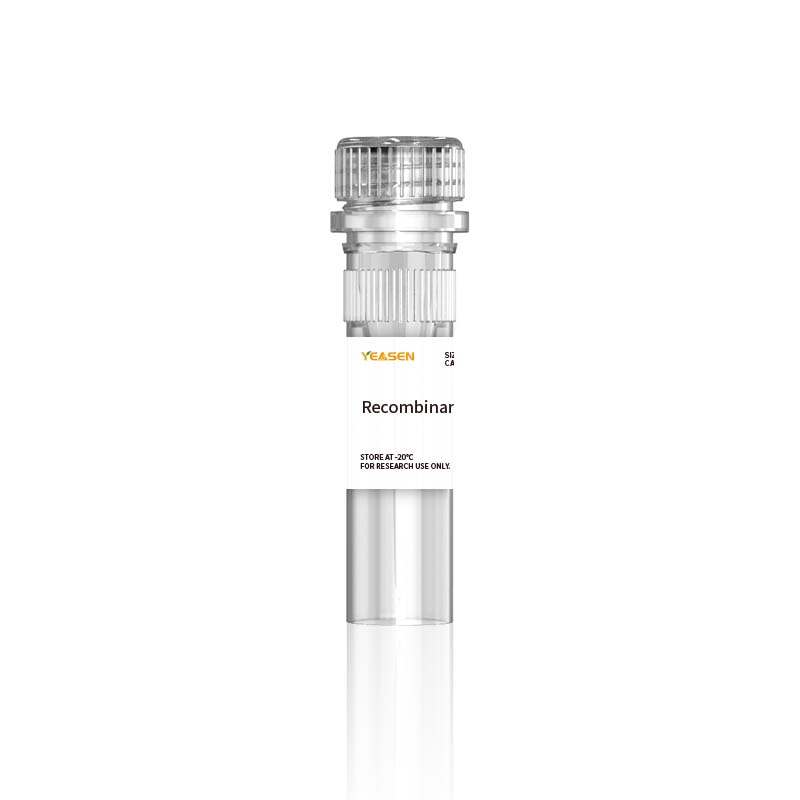Description
ErbB3, also called Her3 (human epidermal growth factor receptor 3), is a type I membrane glycoprotein that is a member of the ErbB family of tyrosine kinase receptors. ErbB family members serve as receptors for the epidermal growth factor (EGF) family of growth factors. Among ErbB family members, ErbB3 is unique in that it contains a defective kinase domain. ErbB3 is expressed in keratinocytes, melanocytes, skeletal muscle cells, embryonic myoblasts and Schwann cells. Monomeric ErbB3 serves as a low affinity receptor for the heregulins (HRG). ErbB3 heterodimerizes with ErbB2 to form a high affinity receptor complex. In contrast, ErbB3 homodimerization or heterodimerization with ErbB4 forms a low affinity heregulin-binding complex. Because ErbB3 contains a defective kinase domain, the kinase domain of ErbB2 is responsible for initiating the tyrosine phosphorylation signal through the heterodimeric receptor. It has been found that a discrete three amino acid signal in the ErbB3 cytoplasmic domain is critical for transactivation of ErbB2. The cytoplasmic domain of ErbB3 also contains six consensus binding motifs for the SH2 domain of the regulatory p85 subunit of phosphoinositide 3-kinase (PI 3-kinase, PI3K) as well as one proline-rich consensus binding motif for the SH3 domain of p85.
Specifications
|
Synonyms |
ErbB3; ErbB-3; HER3; HER3c-erbB-3; LCCS2; MDA-BF-1; MGC88033; p180-ErbB3; p45-sErbB3; p85-sErbB3; ERBB3 |
|
Uniprot No. |
P21860.1 |
|
Source |
Recombinant Biotinylated Human Her3/ErbB3 Protein is expressed from HEK293 Cells with His tag and Avi tag at the C-terminal. It contains Ser20-Thr643. |
|
Molecular Weight |
Approximately 71.6 kDa. Due to glycosylation, the protein migrates to 90-100 kDa based on Tris-Bis PAGE result. |
|
Purity |
> 95% as determined by SDS-PAGE and HPLC. |
|
Activity |
ELISA Data: Immobilized Biotinylated Human Her3 at 0.5 μg/mL (100 μL/well) on the plate. Dose response curve for Anti-Her3 Antibody, hFc Tag with the EC50 17.6 ng/mLdetermined by ELISA. |
|
Endotoxin |
< 1.0 EU per 1μg of the protein by the LAL method. |
|
Formulation |
Lyophilized from 0.22 μm filtered solution in PBS (pH 7.4). Normally 8% trehalose is added as protectant before lyophilization. |
|
Reconstitution |
Centrifuge tubes before opening. Reconstituting to a concentration more than 100 μg/mL is recommended (usually we use 1 mg/mL solution for lyophilization). Dissolve the lyophilized protein in distilled water. |
Storage
Transported with ice packs. Store at -20℃, valid for one year.。
After reconstitution, store at -20 to -80°C in unopened state for 3-6 months. After reconstitution, store at 2-8°C for 2-7 days.
It is recommended to freeze the aliquots for first use,Avoid repeated freezing and thawing.
Note
1. Avoid repeated freezing and thawing.
2. For your safety and health, please wear a lab coat and disposable gloves when operating.
3. This product is for scientific research purposes only.
Product Data


Payment & Security
Your payment information is processed securely. We do not store credit card details nor have access to your credit card information.
Inquiry
You may also like
FAQ
The product is for research purposes only and is not intended for therapeutic or diagnostic use in humans or animals. Products and content are protected by patents, trademarks, and copyrights owned by Yeasen Biotechnology. Trademark symbols indicate the country of origin, not necessarily registration in all regions.
Certain applications may require additional third-party intellectual property rights.
Yeasen is dedicated to ethical science, believing our research should address critical questions while ensuring safety and ethical standards.

